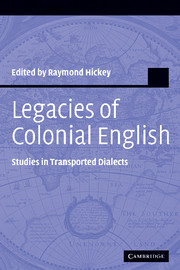Book contents
- Frontmatter
- Contents
- List of figures, maps and tables
- Contributors
- Foreword
- Introduction
- Part I Out of Britain
- Part II The New World
- Part III The southern hemisphere
- 13 South African English
- 14 English transported to the South Atlantic Ocean: Tristan da Cunha
- 15 English on the Falklands
- 16 English input to Australia
- 17 English input to New Zealand
- 18 English input to the English-lexicon pidgins and creoles of the Pacific
- Part IV English in Asia
- Appendix 1 Checklist of nonstandard features
- Appendix 2 Timeline for varieties of English
- Appendix 3 Maps of anglophone locations
- Glossary of terms
- General references
- Index of names
- Index of languages and varieties
- General index
13 - South African English
Published online by Cambridge University Press: 22 September 2009
- Frontmatter
- Contents
- List of figures, maps and tables
- Contributors
- Foreword
- Introduction
- Part I Out of Britain
- Part II The New World
- Part III The southern hemisphere
- 13 South African English
- 14 English transported to the South Atlantic Ocean: Tristan da Cunha
- 15 English on the Falklands
- 16 English input to Australia
- 17 English input to New Zealand
- 18 English input to the English-lexicon pidgins and creoles of the Pacific
- Part IV English in Asia
- Appendix 1 Checklist of nonstandard features
- Appendix 2 Timeline for varieties of English
- Appendix 3 Maps of anglophone locations
- Glossary of terms
- General references
- Index of names
- Index of languages and varieties
- General index
Summary
Preliminaries: Extraterritorial languages
General concepts
An extraterritorial language (henceforth ETL) is one that has been transported from its original geographical home to another area. If we take this concept to its logical conclusion, all human languages spoken outside of East Africa are extraterritorial (henceforth ET) versions of whatever was spoken by the first anatomically modern Homo sapiens who left Africa about 60,000 years ago. This kind of historical depth is unavailable to language historians, and the notion is generally applied over relatively shorter time-spans.
But it is useful in the fairly long term; for example, Icelandic, though an ‘autonomous’ language (in the sense that it is not intercomprehensible with any other Scandinavian language) still bears the marks of being ninth-century ET Norwegian; and English itself (in all its varieties) could be considered to be ET North-Sea Germanic, since it was brought to the British Isles from the continent in the fifth century; indeed this origin accounts for the particular features it shares with Frisian in particular, Dutch, and somewhat less with German. Its ET origin is the key that unlocks its prehistory.
- Type
- Chapter
- Information
- Legacies of Colonial EnglishStudies in Transported Dialects, pp. 363 - 386Publisher: Cambridge University PressPrint publication year: 2005
- 3
- Cited by



